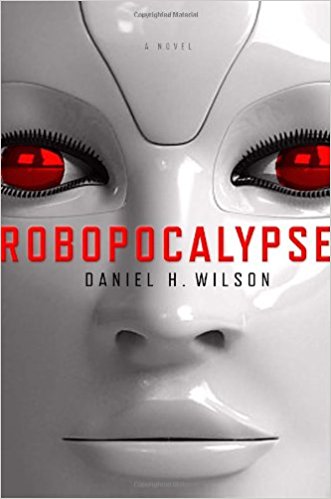

A massively powerful artificial intelligence called Archos, taking on the persona of a shy human boy, comes online and can't be contained - it begins, unbeknownst to humans, to silently take over our smart cars, power grids, aircraft guidance systems, and computer networks - the entire global assembly that runs our lives. In the near future, at a precise moment no one will notice, all the dazzling technology that runs our world will spontaneously malfunction. Then later, when they started designing themselves, Rob looked familiar but distorted, like people and animals from some other universe, built by some other god." "People should know that, at first, the enemy looked like everyday stuff - cars, buildings, phones. Still, my beefs are fairly small in the grand scheme of things, and maybe I'll get what I want from the "missing" characters in Robogensis, which I am totally going to read. That character deserved to survive, and if he absolutely had to die it should have been more noble than shambling onto the scene as a robo-meat-puppet.

I'm also a little mad that Lark died "off-screen" and with little ceremony. I definitely want more of Nomura's story, and I want to know what happened to both Paul Blanton and Mathilda Perez after the war. Thinking on it (and realizing there is a sequel), this is probably completely on purpose, and it totally makes sense. My other issues are with some of the characters that loom large in one section or another only to drop out of the narrative completely in others. I like Cormac, and he is a pretty good Everyman character, so why not just give us the whole narrative in Cormac's voice? I liked this story better, but World War Z did the whole reporting vignette narrative thing in a more submersive and convincing way.

If all the narratives are going to be delivered as a novel why have Cormac be the one "writing" the stories at all? I can understand the underlying need for a survivor to be telling the story, but I'm not really sure I'm on board with Cormac being quite so artistic with telling the history of the war.

First, I had a hard time with the weird narrative structure-Cormac is supposed to be the one transcribing these events as they are played back from the box, but we get most pieces in first person and never in Cormac's voice except for his own pieces. Having said that, there are a couple things that inspired me to hold back that last star. Specifically, chapter 4 in part two is surprisingly moving and really highlights why the OwnVoices movement is so important. Beyond that aspect of the story, I was really blown away by Wilson's depiction of the Osage (and one Cherokee) characters. It made me want to throw all my computers out the window and move waaaaay way off the grid.


 0 kommentar(er)
0 kommentar(er)
